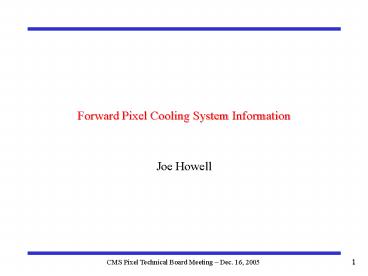Forward Pixel Cooling System Information - PowerPoint PPT Presentation
1 / 11
Title:
Forward Pixel Cooling System Information
Description:
Forward Pixel Cooling System Information. Joe Howell ... A calibrated orifice plate ... disconnect) valve on each side of orifice on supply side which could be ... – PowerPoint PPT presentation
Number of Views:71
Avg rating:3.0/5.0
Title: Forward Pixel Cooling System Information
1
Forward Pixel Cooling System Information
- Joe Howell
2
Sources of Information
- Presentation document by Paola Tropea
- Engineer CERN TS/CV Department
- CMS Tracker Cooling system overview presentation
Dec 03, copy captured in docdb 590 - Very good overview of the entire CMS Tracker
cooling system - Invitation to Tender IT-3230/TS/CMS for cooling
system - Technical Specification for design, construction
and installation of a double loop fluorocarbon
150 kW cooling plant for the CMS Tracker and
Preshower detectors - From CERN EDMS document system
- One of many related documents, yet to review
others - Meeting with Scott Reeves and reference
information Scott provided - Fermilab AD engineer responsible for Fluorinert
cooling systems - Notes and much reference information captured in
docdb 571 - Meeting with CMS Tracker engineers during Dec 05
CMS week - Paolo Petagna, Hans Postema
- My notes and others to be captured in docdb 623
- Presentation material and notes from meeting with
Kurt Gabathuler, PSI - The contact person for barrel mechanics
- Very familiar with forward pixel
- Lots of information mining still remains to be
done
3
Overall system diagram
These units must operate continuously, even in
case of power or water cut, and they will be
cooled by an emergency refrigerator, using the
available Emergency Power Supply (EPS, provided
by CERN).
4
Location of pixel cooling rack
5
Specifications provided by Kurt Gabathuler, PSI
Forward Pressure map similar to this Barrel
version
6
Pixel secondary system diagram
7
Hydraulic symbols
8
Details of secondary system branches
Pixel Detector
9
Pixel secondary system notes
- 4 branches for Z side and 4 branches for Z side
- Each branch has
- a manual throttle valve to set flow
- Pneumatic shutoff valve at inlet and outlet
- A calibrated orifice plate
- Schrader (self sealing quick disconnect) valve on
each side of orifice on supply side which could
be instrumented to measure flow - Schrader valve on return side
- Reservoir tank is instrumented with a strain gage
balance to measure weight change for leak
detection - The CERN engineers described a system to perform
a leak check on each branch by isolating each
branch with the pneumatic valves and then
monitoring for a pressure drop/rise. (I have not
seen a PID diagram for these elements yet) - My understanding of the CERN engineers
philosophy for leak detection/action is If you
have a small leak that is not detectable with the
reservoir balance you would not stop running even
if you knew it existed. If the leak is large
enough to be detected with the balance you would
then proceed to leak check each branch and then
leave that branch turned off if necessary.
10
Notes from discussions with CERN engineers
- They are well aware of Fluorinert/elastomer
compatibility issues - Fluorinert decomposition
- Charcoal filters were tested and shown to remove
Fluorine ions - Paola Tropeas presentation lists Alumina filters
for acid removal - Cleaning and material selection to remove
hydrogen sources was emphasized - Discussed continuous chemical monitoring vs
periodic sampling - They requested a concise description of
conditions that caused problems in Fluorinert
system at Fermilab - CERN engineers expressed concern with long term
integrity of fluid connections - Seemed less confident of radiation resistance of
epoxy used at blade connection points - Also suggested metal connection instead of
silicon tubing - They were interested in 3M document that gave
guidance on how to seal fluid connections. I got
the impression they have struggled with leaks in
an existing system. - Thermal screen is intended to maintain un-powered
silicon cold in the event of a power outage or
primary system failure - Sniffer lines for smoke detection in tracker
volume - Supply and return lines are copper and there is
some experience with copper/aluminum
compatibility during tests of the thermal screen
11
Miscellaneous notes
- Experience with a radiation induced Fluorinert
decomposition in Fermilab AD led to extensive
investigation - Information exchange with 3M and others
- Special filter developed by 3M is used in all
applications - My impression is that every novice user of
Fluorinert has problems with leaks and leak
detection
- Notes from discussion with Jeff Spalding about
integration area infrastructure - C6F14 Plant capable of delivering 10 C (uses 6
C chilled water CERN standard) - Could be upgraded to run colder
- Interlock system (one to share with Pixel and
Barrel) 16 temp, 8 humidity, 8 outputs - Could be loaned when available































